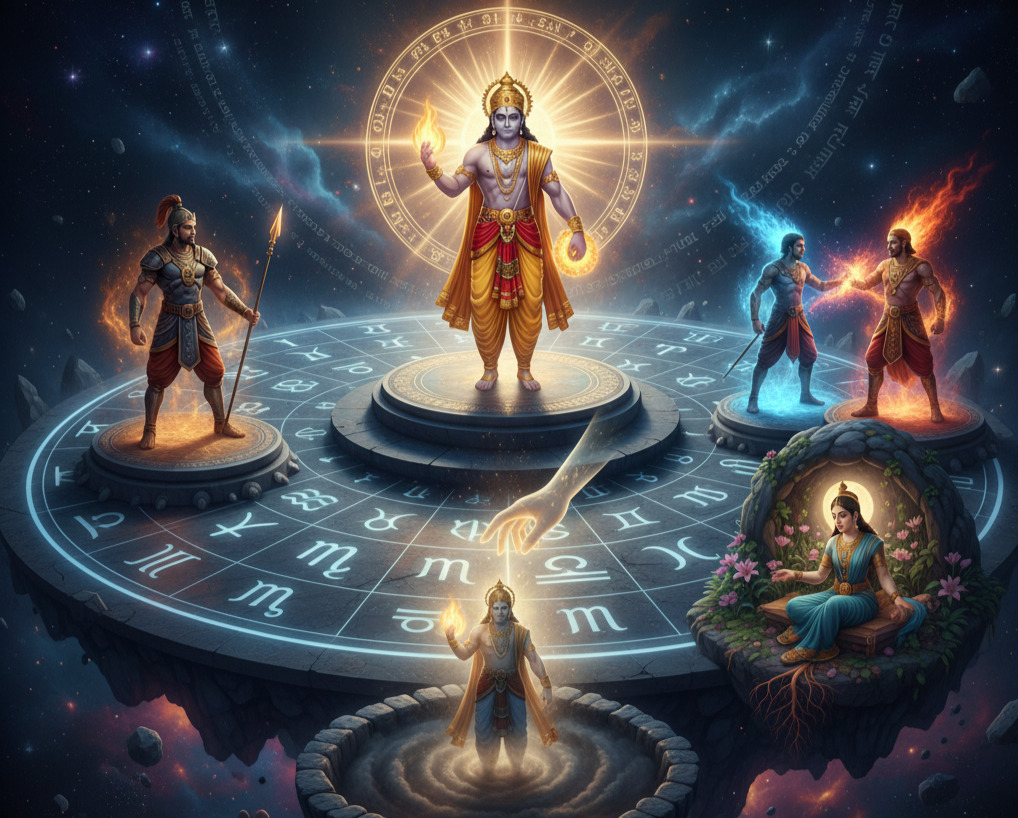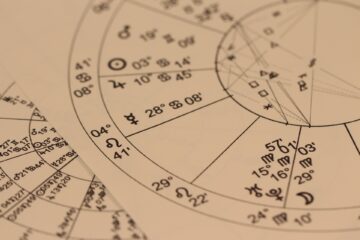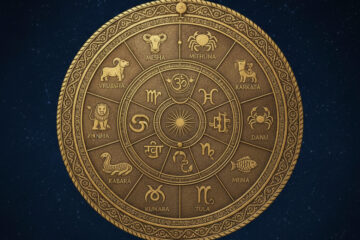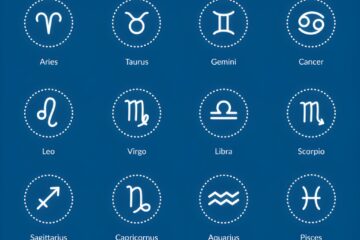The dignity of planets in Vedic astrology shows how comfortably and powerfully a planet can act in a chart. Think of each planet as a traveler: in some signs it moves like it owns the room; in others it’s tense, compensating, or restricted. Dignity is not “good vs bad.” It is the level of freedom, stability and clarity with which a planet can express its nature.
In Jyotish, the dignity of a planet is defined by its relationship to the sign it occupies. Classical systems recognize five primary states: Exaltation, Debilitation, Moolatrikona, Own Sign, and Enemy (or uncomfortable) Sign. Each state affects how the planet delivers results in that house, over time, under timing periods (daśā / bhukti).
Why Planetary Dignity Matters
When a planet is strong in dignity, it expresses cleanly, like a voice speaking in its native language. When it’s weak or strained, the same function becomes indirect, delayed, distorted, or overcompensated. Understanding planetary dignity lets you read how a person will experience that planet’s themes — with ease, with work, or with karmic friction they’ll have to grow through.
Exaltation — Maximum Clarity and Charge
Exaltation is the highest expression of a planet’s nature. An exalted planet acts with confidence, purity and purpose. The Sun in Aries, Jupiter in Cancer — these are classical examples where the planet is considered to radiate its best qualities.
In exaltation, the planet’s signal is loud and coherent. It performs boldly, often attractively, and can create visible success. Ancient sources such as Parāśara Hora Shastra describe exaltation as a state of high strength and full readiness. This often looks like natural authority (Sun), moral confidence (Jupiter), clarity of desire (Mars), refined affection (Venus), or precise intellect (Mercury), depending on which planet you’re reading.
However, “strong” is not the same as “benevolent.” An exalted planet can still create stress if:
- It rules difficult houses (like the 6th, 8th or 12th).
- It aspects vulnerable areas (health, marriage, mental peace).
- Or it operates under harsh conjunctions.
Exaltation means the planet can act decisively. It does not mean the action is always gentle, ethical or easy to live with. The dignity of planets in Vedic astrology tells us capability — not morality.
Debilitation — Tension, Insecurity & Forced Evolution
Debilitation is the inverse of exaltation. It occurs in the sign opposite exaltation. The Sun in Libra, Jupiter in Capricorn — here the planet feels out of its comfort zone. Expression becomes strained, self-doubting, indirect, or defensive.
Debilitated placements can manifest as confusion (“What is my role?”), low confidence (“Do I deserve this?”), or compensation (“I’ll overperform to hide the weakness”). You often see themes like approval-seeking, burnout, transactional attachment, guilt, or internal conflict around the areas ruled by that planet.
But debilitation is not doom. Classical Jyotish openly allows for redemption and inversion of weakness:
- Benefic aspects can steady a debilitated planet.
- Good house placement (like a kendra or trikona) can anchor it.
- Cancellation of debility (Neecha Bhanga Raja Yoga) can flip the script, turning insecurity into power. This is why many people with “weak” placements become forcefully successful: they are trained by pressure.
Modern interpreters, including 20th-century teachers like B.V. Raman, point out that a debilitated planet often becomes the place where you build grit. You don’t get the gift for free — you carve it from resistance.
Moolatrikona — Rooted Power
Moolatrikona (“root base”) is the zone where a planet is both comfortable and actively engaged. Here it is not just “at home,” it is alert, focused, and in stable command.
Example: Mars in Aries (especially early degrees); Saturn in Aquarius (early degrees). A planet in its Moolatrikona sign tends to give consistent, reliable, sustained results. Not flashy peaks, not drama — steady ability.
In practice, many astrologers quietly favor Moolatrikona over exaltation. Exaltation can spike. Moolatrikona endures. Where exaltation can feel like a wave, Moolatrikona feels like a spine.
Own Sign — Safe, Natural Expression
Own sign means the planet is in one of the signs it rules. Venus in Taurus, Moon in Cancer, Mercury in Gemini or Virgo, etc. In own sign, a planet behaves like someone in their own house: relaxed, present, functional, not pretending.
Planets in own sign usually deliver what they promise without distortion. Venus can love in a way that feels real. Mercury can communicate cleanly. Saturn can work with discipline instead of fear. The results are “normal strength”: not over-amplified (exaltation), not defensive (debilitation), not compensating. Just honest output.
Own sign placements also stabilize the topics ruled by that planet. They make life feel structurally supported in those areas — career, relationships, finances, self-image, etc., depending on rulership and house placement.
Friend / Neutral / Enemy Sign — The Negotiated State
When a planet sits in a sign owned by a friendly planet, it functions decently. In a neutral sign, it performs adequately but without much passion. In an enemy sign, the planet lives in tension with the environment it occupies.
For example: Mars in Gemini (ruled by Mercury) or Venus in Aries (ruled by Mars). The style of the sign and the instinct of the planet clash. Mars wants direct, physical assertion. Gemini wants mental agility and verbal juggling. Venus wants harmony and pleasure. Aries wants conquest and immediacy. The result can be mixed, dramatic, brilliant, or unstable — depending on aspects and house context.
This is where interpretation matures. The dignity of planets in Vedic astrology is not binary. An “enemy sign” does not mean failure. It means the expression of that planet will cost energy. It will require handling, awareness, and sometimes negotiation with self.
Dignity Is Psychological, Not Just Technical
Traditionally, dignity is used to judge results and timing. In modern reading, dignity also describes the person’s relationship with that planet’s function.
Exalted Venus can indicate emotional literacy, refined taste, a natural sense of connection and beauty. Debilitated Venus can show wounded self-worth, transactional attachment, or anxiety in intimacy — which can become the fuel for deep relational work. Both are karmic teachers. One says “use what you already know.” The other says “become what you are not yet.”
This is why dignity cannot be reduced to “good” or “bad.” It’s instruction. It’s curriculum.
Synthesis: Never Judge Dignity in Isolation
A planet’s dignity is powerful, but it is never the whole story. Every planet must be judged in a full reading:
• Sign placement (dignity, friend/enemy relationship)
• House placement (where does it act?)
• Aspects and conjunctions (who is modifying it?)
• Shadbala (overall strength)
• Dasha/transit context (when does it actually deliver?)
• Divisional charts (does it stay strong in Navamsa, Dashamsha, etc.?)
In clean terms: dignity shows a planet’s comfort level. The rest of the chart shows how that comfort (or discomfort) is used. This is why two people with “the same exalted planet” live completely different stories.
Real reading is compassionate. The dignity of planets in Vedic astrology is not there to flatter you or scare you. It’s there to tell you where power flows easily… and where evolution is demanded.
Important Notes
Does an exalted planet always give good results?
No. Exaltation gives a planet a strong voice, not a moral guarantee. An exalted planet ruling difficult houses (like the 6th, 8th, or 12th) can still generate stress, confrontation or health pressure. Meanwhile, an exalted benefic in a supportive house can feel like grace. Context decides. Use lordship, house placement and aspects before you celebrate — or panic.
Can a debilitated planet still produce success?
Yes. Debilitation means “uncomfortable,” not “useless.” With benefic support, helpful house position, or Neecha Bhanga Raja Yoga (cancellation of debility), a debilitated planet can become the engine of survival skills, ambition, empathy and resilience. Many people with debilitated placements become exceptional because they were forced to build strength consciously.
How important is Moolatrikona compared to exaltation?
Moolatrikona is often more stable. Exaltation can be intense and dramatic, like a spotlight. Moolatrikona behaves more like a rooted power source — reliable, steady, sustainable. Many traditional readers quietly trust Moolatrikona for long-term outcomes because its rhythm is less volatile.
FAQ — Reading Planetary Dignity in Real Charts
What is the difference between own sign and Moolatrikona?
In own sign, the planet is “at home,” safe and comfortable. In Moolatrikona, the planet is not only comfortable but actively doing its core job with confidence and precision. Own sign = stable base. Moolatrikona = mission mode.
Example: Mars in Aries (Moolatrikona zone) acts decisively, with clean assertion. Mars in Scorpio (own sign) acts deeply, strategically, sometimes silently. Both are strong, but the style and tempo differ.
How do I interpret dignity when multiple planets are in different states?
Never isolate. A single exalted planet cannot “save” a chaotic chart if it is combust, hemmed in by malefics, or ruling tough houses. Likewise, a debilitated planet with yogas, benefic aspects and high shadbala may outperform expectations. Classical Jyotish — especially Parāśara-based methods — insists on synthesis. Dignity is one limb of strength, not the full body.
Do modern astrologers interpret exaltation differently than classical texts?
Modern interpretation adds psychological nuance. Exaltation is seen as clean access to that planet’s archetype. Debilitation is seen as developmental pressure: you must learn how to integrate that energy with awareness. This aligns with the deeper idea that karma is not just “events” but also “how you metabolize experience.”
Conclusion — Power, Pressure, and Choice
Planetary dignity is the language of comfort. Exalted placements speak fluently; debilitated placements speak with an accent that life will force you to refine. Moolatrikona holds steady. Own sign protects. Enemy sign negotiates. All of it is useful.
In the end, the dignity of planets in Vedic astrology is not just about prediction — it’s about self-mastery. Where are you already strong? Where are you still being trained? That is where karma is asking you to pay attention.
Ask your karma. Decode your chart at Much Needed Astro.




